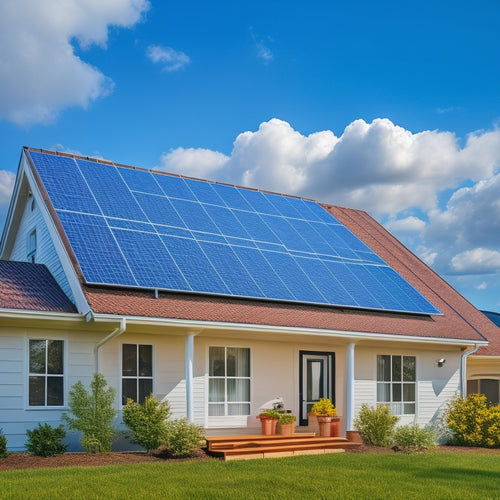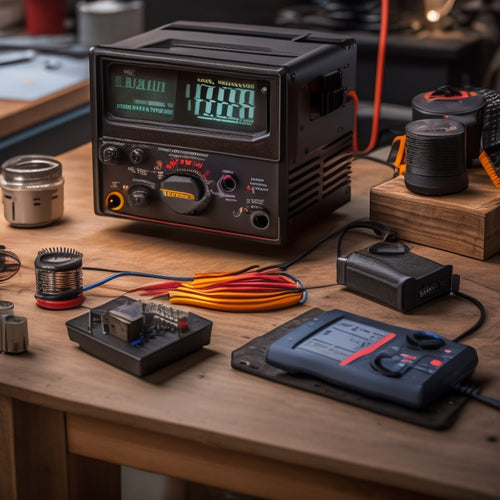
Best Off-Grid Uses for Small Solar Power Systems
Share
Small solar power systems are excellent for off-grid applications, providing reliable energy for essential appliances like refrigerators and lights, as well as higher-demand devices like power tools. By utilizing these systems, you reduce your reliance on fossil fuels and cut down electricity bills considerably. It's vital to assess your daily power needs and choose appropriately sized solar panels and batteries to maximize efficiency. Investing in quality components enhances system performance and durability. With these advantages, you'll not only promote sustainability but also enjoy long-term savings. There's plenty more to investigate regarding optimizing your off-grid energy solutions.
At a Glance
- Small solar power systems can provide energy for lighting, refrigeration, and small appliances, enhancing off-grid living.
- These systems support renewable energy solutions, reducing reliance on fossil fuels and lowering carbon footprints.
- Energy storage solutions, such as lithium-ion batteries, ensure power availability during non-sunny periods.
- Customizable solar systems allow users to optimize energy usage based on specific household needs.
- Long-term cost savings from reduced electricity bills enhance financial stability and promote sustainable practices.
Eco-Friendly Energy Solution
Using small solar power systems is a practical way to utilize renewable energy right at your home.
By integrating these systems, you can greatly reduce your carbon footprint while enjoying reliable electricity.
This eco-friendly solution not only benefits the environment but also lowers your reliance on fossil fuels.
Renewable Energy Source
Utilizing solar power provides a reliable and eco-friendly energy solution that can greatly reduce your carbon footprint. As a renewable energy source, solar power captures the sun's abundant energy for various applications, giving you independence from traditional energy grids.
With the right solar panel types, such as monocrystalline or polycrystalline, you can optimize energy production based on your specific needs.
Investing in a small solar power system allows you to power everything from lights to appliances while enjoying the freedom of energy autonomy.
The effectiveness of your system depends not only on the panels but also on energy storage solutions, like lithium-ion batteries, which guarantee you have access to power even during cloudy days or nighttime.
This combination maximizes your energy efficiency and provides a constant power supply.
Reducing Carbon Footprint
Solar power systems greatly contribute to reducing your carbon footprint by providing clean energy that doesn't rely on fossil fuels. By utilizing the sun's energy, you can power your home and appliances without emitting harmful greenhouse gases. This shift not only lessens your reliance on traditional energy sources but also supports a sustainable lifestyle.
Implementing carbon offset strategies becomes straightforward with solar power. For instance, by generating your own electricity, you effectively reduce the demand for energy from fossil fuels, which are major contributors to carbon emissions. Each kilowatt-hour you produce is a step towards minimizing your environmental impact.
Moreover, small solar power systems can be customized to fit your specific needs, whether it's for powering lights, charging batteries, or running small appliances. This flexibility allows you to adopt freedom in energy consumption while keeping your carbon footprint low.
Incorporating solar energy into your daily life isn't just about saving money; it's about making a conscious choice for the planet. By investing in solar technology, you're not only enhancing your self-sufficiency but also playing a crucial role in the global effort to combat climate change.
Cost Savings Over Time
Investing in a small solar power system can lead to significant cost savings on your electricity bills over time.
By utilizing renewable energy, you not only reduce your monthly expenses but also increase the potential for long-term returns on your investment.
With a payback period of 1 to 7 years, these systems prove to be a wise financial choice, especially considering the benefits of solar energy.
As energy prices continue to rise, your solar system becomes an even more important asset for financial stability.
Reduced Electricity Bills
Switching to small solar power systems can lead to significant reductions in your electricity bills over time. By investing in solar panel installation, you're not just cutting costs; you're taking a step towards energy independence. This shift not only lessens your reliance on traditional energy sources but also protects you from rising utility rates.
To give you a better idea of potential savings, consider the following table:
| Year | Average Savings | Cumulative Savings |
|---|---|---|
| 1 | $300 | $300 |
| 2 | $320 | $620 |
| 3 | $340 | $960 |
| 4 | $360 | $1,320 |
As you can see, your savings will grow each year, allowing you to allocate funds elsewhere or reinvest in more sustainable practices. By choosing small solar systems, you're not just reducing your expenses; you're also creating a path for a more self-sufficient lifestyle. Welcome the freedom that comes with lower electricity bills and enjoy the peace of mind knowing you're contributing to a greener planet.
Long-Term Investment Returns
Often, homeowners underestimate the long-term investment returns associated with small solar power systems. By utilizing solar energy, you not only reduce your dependence on conventional power sources but also pave the way for considerable financial stability over time.
When you consider your investment horizon, the initial costs of a solar setup often pale in comparison to the savings you'll accrue. For many, the shift to solar means slashing or even eliminating electricity bills. With rising utility prices, the savings can compound greatly over the years.
Additionally, government incentives and potential tax credits can further enhance your return on investment, making solar an even more attractive option. Once you've covered the initial investment, maintenance costs for solar systems are relatively low, ensuring that your savings continue to grow.
This translates to a powerful sense of freedom, knowing that you're not only contributing to a sustainable future but also securing your financial future.
In essence, small solar power systems offer a practical path to long-term cost savings, enabling you to enjoy uninterrupted energy independence while fortifying your financial stability for years to come.
Key Specifications Overview
When selecting a small solar power system for off-grid use, understanding key specifications is vital.
You'll want to take into account system capacity, which determines how much energy you can generate and store, as well as component efficiency metrics that impact overall performance.
Proper system sizing and load calculation are fundamental to guarantee reliability and prevent overload or underload, as highlighted in key components of off-grid systems.
These factors will assure that your system meets your energy needs effectively.
System Capacity Considerations
Understanding the capacity of your small solar power system is vital for optimizing its performance in off-grid applications. To achieve this, you'll need to focus on system sizing and load management.
Start by determining your energy requirements; calculate the total watt-hours you consume daily. This helps you size your solar array and battery storage accurately.
Next, consider the peak sunlight hours in your location. This information will guide you in selecting the right number of solar panels to meet your energy needs. For instance, if you need 1,500 watt-hours daily and receive five peak sunlight hours, you'll require a system that can generate at least 300 watts.
Load management is also essential. Prioritize your energy consumption by identifying which devices are vital and which can be used less frequently. By strategically managing your loads, you can guarantee your system runs efficiently and extends the lifespan of your components.
Always account for system losses, such as inefficiencies in inverters and wiring. By understanding these aspects, you'll maximize your small solar power system's capacity, granting you the freedom to live off the grid more sustainably.
Component Efficiency Metrics
After optimizing your system capacity, it's important to evaluate the efficiency of the components within your small solar power system.
Start by examining the solar panels, which should have a high efficiency rating, typically between 15% to 22%. This metric indicates how effectively they convert sunlight into electricity.
Pay attention to the inverter as well; it should boast an efficiency of at least 90% to minimize energy loss during conversion from DC to AC.
Next, consider battery performance. Look for deep-cycle batteries with minimal performance degradation over time, ideally maintaining at least 80% of their capacity after 3,000 cycles. This guarantees long-term reliability and less frequent replacements, enabling your off-grid lifestyle.
Finally, assess the durability of all components. Select materials that withstand environmental factors like UV exposure and moisture.
Components with higher durability ratings will last longer and require less maintenance, freeing you from constant upkeep.
Selecting Based on Energy Needs
To effectively select a small solar power system, you need to assess your power requirements first.
Start by estimating your daily energy consumption to understand how much power you'll need to generate. This step is vital for ensuring your system can meet your off-grid energy demands efficiently.
Additionally, consider conducting an energy audit to identify inefficiencies and prioritize your energy usage, which can help in optimizing your system configuration for maximum effectiveness in meeting your needs.
This energy audit process is fundamental for identifying how best to allocate your energy resources.
Assessing Power Requirements
When selecting a small solar power system, it's crucial to first assess your energy needs to guarantee you choose a setup that will effectively power your off-grid activities. Start by conducting a load analysis, which helps you identify the devices you plan to run and their power requirements. This will pave the way for efficient power management, ensuring you don't overspend on unnecessary capacity.
To get a clearer illustration, here's a simple table to demonstrate potential energy needs:
| Device | Power (Watts) | Hours per Day |
|---|---|---|
| LED Lights | 10 | 5 |
| Laptop | 50 | 4 |
| Small Fridge | 100 | 24 |
| Phone Charger | 5 | 2 |
Estimating Daily Consumption
Once you've conducted a thorough load analysis, the next step is estimating your daily energy consumption. This will help you determine the right size and type of solar panels for your off-grid system.
Start by listing your appliances and their wattage. Multiply the wattage by the number of hours you use each appliance daily. For example, if you use a 60W bulb for five hours, that's 300 watt-hours (Wh).
Next, sum up the total watt-hours for all your devices. This gives you your daily energy usage, an essential figure for selecting the appropriate solar panel types.
Consider peak sunlight hours in your location, which will affect how much energy your solar panels can generate.
Don't forget to factor in seasonal variations and potential inefficiencies in the system. You may want to add a buffer of 20-30% to your calculations to guarantee you meet your energy needs, even on cloudy days.
Lower Environmental Impact
By utilizing small solar power systems, you greatly reduce your carbon footprint compared to conventional energy sources.
These systems capture renewable energy, which helps mitigate greenhouse gas emissions.
As a result, you contribute to a cleaner environment while enjoying the benefits of off-grid living.
Reduced Carbon Footprint
Utilizing small solar power systems greatly reduces your carbon footprint, making a tangible difference in environmental impact. By capturing the sun's energy, you can considerably lower your reliance on fossil fuels, which are notorious for their greenhouse gas emissions. This shift not only aligns with sustainable practices but also improves your independence from traditional energy sources.
When you install a small solar power system, you're actively contributing to the reduction of pollutants that harm our planet. Each kilowatt-hour generated from solar energy translates into fewer emissions released into the atmosphere. This means cleaner air for you and your community, alongside the broader environmental benefits.
Moreover, small solar systems are versatile and can be customized to your specific needs, whether for powering appliances, lighting, or even charging electric vehicles. The freedom to generate your own clean energy enables you to make eco-conscious choices that benefit both you and the environment.
In a world increasingly focused on climate change, adopting small solar power systems not only encourages a sustainable lifestyle but also promotes a healthier planet for future generations.
Welcome this change and join the movement towards a greener future.
Frequently Asked Questions
Can Small Solar Power Systems Power an Entire Home?
Small solar power systems can't typically power an entire home unless they're large enough. You'll need to assess system size to achieve energy independence, ensuring you generate enough power for your specific needs and lifestyle.
What Maintenance Is Required for Small Solar Power Systems?
Think of your solar system as a garden; it needs nurturing. Regular system cleaning, battery maintenance, inverter checks, and performance monitoring guarantee it thrives, giving you the freedom to utilize renewable energy with efficiency.
How Long Do Small Solar Power Systems Last?
Small solar power systems typically last 25 to 30 years. However, their system lifespan depends on efficiency factors like maintenance, sunlight exposure, and quality of components. Regular care guarantees you maximize your investment and energy independence.
Can I Use Solar Power Systems During Cloudy Days?
Even in cloudy conditions, you can utilize solar energy. While solar efficiency decreases, your system still generates power. It's not a sun-drenched paradise, but it's enough to keep you free and connected.
Are There Any Government Incentives for Small Solar Power Systems?
Yes, there are government incentives for small solar power systems. You can take advantage of federal tax credits and state rebates, considerably reducing your initial investment and enhancing your freedom from traditional energy sources.
Explore More
Incorporating a small solar power system into your off-grid lifestyle isn't just a savvy choice; it's a step toward a brighter, more sustainable future. By utilizing the sun's abundant energy, you'll enjoy significant cost savings while reducing your carbon footprint. Remember, the right system customized to your energy needs can change your living space into an eco-friendly haven. Welcome this gentle shift toward renewable energy, and watch as your impact on the planet diminishes pleasingly.
Related Posts
-

Top Portable Refrigerators for Camping Adventures
When you're camping, having a reliable portable refrigerator can make all the difference for keeping your food fresh ...
-

Cost of Solar Panel Installation
You can expect to pay between $15,000 and $30,000 or more for a typical solar panel installation, depending on the sy...
-

Key Features of a DC to AC Converter
A DC to AC converter features high efficiency and conversion rates, which reduce energy costs and improve performance...


